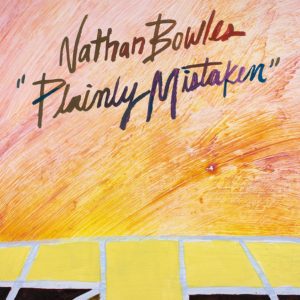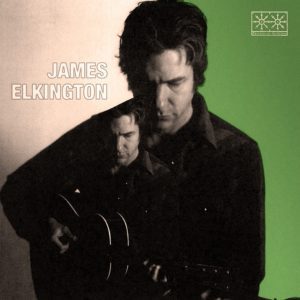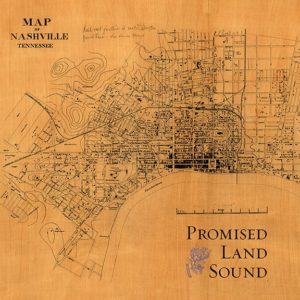Entrancing guitarist and singer Jake Xerxes Fussell follows his celebrated self-titled debut (produced by William Tyler) with a moving new album of Natural Questions in the form of transmogrified folk/blues koans. This time these radiant ancient tunes tone several shades darker while amplifying their absurdist humor, illuminating our national, and psychic, predicaments. Featuring art by iconic painter Roger Brown and contributions from three notable Nathans—Nathan Bowles (Steve Gunn), Nathan Salsburg (Alan Lomax Archive), and Nathan Golub (Mountain Goats)—as well as Joan Shelley and Casey Toll (Mt. Moriah).
Highlights
- Available on 150g virgin vinyl as an LP, with heavy-duty 24pt matte jacket with detailed song notes and sources, color labels, and high-res download code for the entire album.
- CD edition features heavy-duty matte gatefold jacket and LP replica artwork.
- Artwork features two paintings by iconic Chicago Imagist artist Roger Brown (1941–1997).
- PoB Artist Page for Jake Xerxes Fussell.
- RIYL: Michael Hurley, Bob Dylan, John Prine, Dave Van Ronk, Jim Dickinson, Raccoon Records, Joan Shelley, Nathan Bowles, Nathan Salsburg, William Tyler, Daniel Bachman, Wilco.
Physical format music purchases from the PoB webstore and Bandcamp include digital downloads when feasible. Some, but not all, pre-2023 vinyl pressings also include a download coupon. For digital preorders and high-resolution digital downloads, please visit our Bandcamp page.
Tracklist
A1. “Jump for Joy” 4:15
A2. “Have You Ever Seen Peaches Growing on a Sweet Potato Vine?” 6:10
A3. “Pinnacle Mountain Silver Mine” 4:18
A4. “Furniture Man” 4:40
A5. “Bells of Rhymney” 4:02
B1. “Billy Button” 4:45
B2. “Canyoneers” 4:34
B3. “St. Brendan’s Isle” 3:53
B4. “Lowe Bonnie” 6:44
Catalog Number/Release Date
PoB-031 / April 14, 2017
Purchase from PoB above or support via
- Bandcamp (digital/physical)
- Other Online Options (digital/physical)
- Local Record Stores
More from Jake Xerxes Fussell
-

Jake Xerxes Fussell: Good and Green Again
$9.00 – $29.00
Jake Xerxes Fussell: Hills of Mexico
$1.00 – $2.00Weight N/A FORMAT Album Narrative
- Photo by Brad Bunyea
- Photo by Brad Bunyea
- Photo by Brad Bunyea
- Photo by Brad Bunyea
“Thus is nature: beyond all things is the ocean, beyond the ocean nothing.”
– Lucius Annaeus Seneca, from Natural Questions, c. 65 AD
Roger Brown, whose preternaturally vivid paintings grace Durham, North Carolina guitarist and singer Jake Xerxes Fussell’s second album What in the Natural World, is usually associated with the loose confederacy of artists known as the Chicago Imagists, but at heart he was fundamentally a Southern boy whose Alabama origins root his work. (He grew up in Opelika, about thirty miles northwest of Fussell’s childhood home in Columbus, Georgia, and counted Elvis Presley as a distant cousin.) Influenced both by comics and the folk and self-taught art he collected, Brown’s distinctive landscapes—which oscillate between architectural and natural, urban and bucolic, busy and barren, depicting the incursion of culture on our environment—are meticulously rendered in a stylized idiom of alien symmetries: recursive, patterned terrains as saturated with vibratory color as with psychological and political subtexts.
Both Brown and Fussell approach their art as a consequence of their practices as collectors and scholars of Southern vernacular culture—material culture and music, respectively—imbuing their own inventive work with the clarity and vigor of folk traditions, while reframing their durable, multivalent strangeness for our own times. Fussell has become a masterful interpreter and mutative performer of American folk and popular music, always allowing the songs he selects to breathe and swell with oceanic ambiguity, never closing them off to contemporary contexts and sonics. It’s the result of a lifetime dedicated to apprenticeships with master storytellers, from Piedmont blueswomen Precious Bryant and Etta Baker to documentary artists Les Blank and Art Rosenbaum.
So if What in the Natural World feels both several shades darker, and unsettlingly funnier, than Jake’s self-titled 2015 debut (produced by brother-in-arms William Tyler), you need only look around at our national predicament in 2017 for clues. Since then Jake has played around the country, opening for Wilco, dueting with Tyler, and touring with Mt. Moriah, Nathan Bowles, and Daniel Bachman … and the territory he’s traversed, for many of our fellow citizens, doesn’t brook much hope.
This time round Fussell has sourced his repertoire from beyond his primary Southeastern foraging grounds, including songs from the Southwest (“Canyoneers”) and even Wales (“Bells of Rhymney”). He encounters monsters, literal and figurative, everywhere in this landscape of loss and longing—from the hellhounds of “Jump for Joy” to cruel Mr. Brown in “Furniture Man” (“a devil born without horns”); from the oppressive mine owners (“they have fangs, they have teeth”) of “Bells of Rhymney” to the demons and dragons on “St. Brendan’s Isle.” Unlike his debut, the majority of these songs are not nominally traditional; they don’t hail from what Jake calls “the weird void of folk anonymity and the dark, fertile past.” Five of nine are attributed to specific artists, both canonical (Duke Ellington) and obscure (Helen Cockram), and all are recast in vibrant, assured recordings that elide genres and dissolve the false binaries of tradition and innovation, folk and modern, old and new.
What in the Natural World was recorded by Jason Meagher (Steve Gunn, Michael Chapman) in Orange Co., New York, and by Nick Petersen (Horseback, Mt. Moriah) in Orange Co., North Carolina, and features contributions from three notable Nathans—Nathan Bowles (drums, banjo, piano, melodica; Steve Gunn), Nathan Salsburg (guitar on “Pinnacle Mountain”; Alan Lomax Archive), and Nathan Golub (steel guitar; Mountain Goats)—as well as Joan Shelley (vocal on “Lowe Bonnie”) and Casey Toll (bass; Mt. Moriah).
Throughout, Fussell poses Natural Questions in the form of transmogrified folk/blues koans. These nine elliptical riddles, spare but sturdy, driven by Jake’s limpid guitar and understated singing, both absorb and reflect the conditions of their listeners, refusing to offer easy answers. Though the album title lacks a question mark—it can be read as exclamatory or interrogative—all of these songs contain axial, and anxious, questions about the Natural World and our tenuous position within it.
“All the hounds, I do believe, have been killed/Ain’t you thrilled?” The minimally arranged “Jump for Joy” (from Duke Ellington’s eponymous 1941 “Sun-Tanned Revu-sical”) and “Billy Button” (an odd relic of nonsense verse with likely roots in medicine shows and minstrelsy) anchor Sides A and B with mutual echoes. Fussell’s nimbly fingerpicked chord progressions, buttressed by Bowles’ piano and melodica, hew an achingly bittersweet mood of yearning from rough doggerel about “groovy pastures” and “hog meat”—transforming their absurdist lyrics into affecting statements about mortality and the distant promise of paradise. What to do when we finally “stomp up to heaven and meet old St. Pete,” when we arrive in “the happy land of Canaan”? “It’s a long way to travel, and the money for to spend.”
“Have you ever seen peaches growing on a sweet potato vine?” Can nature yield further fruits? Instead of a response to the titular paradox we get sleepily affectionate flirtation: “Wake up, woman, take your big leg off of mine.” (“She’s a married woman, but I love her just the same.”) Bowles shuffles winningly.
“What kind of business has the poor man got/dealing with the Furniture Man?” “Furniture Man,” a desperate tale of poverty, dispossession, and imminent homelessness—its cascading guitar refrain descending into a quiet pit of resignation—is as relevant and heartrending now as it was when first recorded in the 1920s.
“What’s in a man to make him thirst/for the kind of life he knows is cursed?” “Pinnacle Mountain Silver Mine” (by Appalachian Virginia singer Helen Cockram) and “Canyoneers” (by Arizona producer and Lee Hazelwood associate Loy Clingman) explore the rugged topography of risk and impossibly remote rewards. Pinnacle Mountain holds a “secret I may never know” (intimated by Salsburg’s charming, filigreed guitar), but the “lonely river rats” of “Canyoneers” seemingly toil for purely existential reasons. “Have you ever wondered what you’d do when all the chips were down?”
“‘Is there hope for the future?’/Say the brown bells of Merthyr.” The arcane coal miner’s lament “Bells of Rhymney” shares its text, by Welsh poet Idris Davies, with the song popularized by Pete Seeger and the Byrds, complete with personified, protesting bells, but here Jake supplies his own gospel-tinged musical setting. “St. Brendan’s Isle” offers a faux-Celtic companion piece by Arkansan Jimmy Driftwood, wherein monstrous mine owners are replaced by actual brimstone and scaly “monsters that be.”
“How can I live, how can I live?/You wounded me so deep.” The hero of “Lowe Bonnie,” a chilling Alabama variant of the Child murder ballad “Young Hunting” (aka “Henry Lee”), is slain by his jilted lover (voiced here by Joan Shelley) in a deathly embrace, as he watches her “pen knife” spill his “own heart’s blood” onto his feet. Jake’s guitar shivers.
In his first-century scientific and philosophical treatise Natural Questions, Seneca interrogates his environment for answers, venturing some, but warning that “a single lifetime, even though entirely devoted to the sky, would not be enough for the investigation of so vast a subject.” Maybe the meaning of a thing reveals itself only through tradition, through time, through iterative summoning and study. You get the sense, listening to Fussell’s music, and looking at Brown’s paintings, that they would agree.
Acknowledgments
Fussell has a deep respect and affinity for the Southern folk vernacular, though he also maintains his childlike awe for it. [What in the Natural World] marks a move into more existential questions … vignettes of Southern life, with an open-hearted groove that would please scholars and little kids alike—Fussell’s burly, winking voice is made for storytelling. “Have You Ever Seen Peaches” is a hair over six minutes long, but that drone could sustain it for hours … running unbroken and buoyant as a shoal of fish darting downriver, and counterbalancing his open-hearted picking.
– Laura Snapes, NPR Music
9/10 (Full-page Discovered review.) Achingly beautiful… a record that yields a procession of hidden treasures. There’s an almost carefree swing to much of Fussell’s music, the easy authority of his silvery guitar work matched by an invitingly cordial voice that makes these arcane songs shine. Like Ry Cooder, Fussell has an uncanny ability to illuminate the present by propping up a window against the past. Whatever the raw material’s vintage, the protagonist’s pursuit of abstract notion—freedom, empowerment, danger, fulfillment—is every inch as pertinent today.
– Rob Hughes, Uncut
While some have called Fussell’s music “atmospheric,” the descriptor misses his historical grounding; on the flipside, any implication of “root” overlooks the ease and freeness of his sound.The image of a river, featured on both of his albums’ covers, is well suited—the history of each song selection, like tributaries, flow into the main waterway, feeding a powerful current of evolution and exchange. And here is Jake Xerxes Fussell, floating down that river, strumming away.
– Jack Rosenberg, The Oxford American
It’s difficult to imagine another contemporary interpreter delivering a tale of desperation and sadness with such tenderness, warmth, and grace. The room he leaves for the song to breathe allows it to flourish into its own fully-formed, nuanced world – one as familiar today as during the time of its origin. Here, Fussell taps into those roots and in turn carries the pathos across an entire century, creating something wholly his own. No small feat and just one of the many exhibits that display a truth as absolute as the suffering in this song: Jake Xerxes Fussell is a national treasure.
– Chad Depasquale, Aquarium Drunkard
#44 Album of 2017. At once scholarly and swinging, a roistering investigation of the traditions of the Southeastern states. Easygoing virtuosity—co-conspirators included Nathan Salsburg and Nathan Bowles—and an idiosyncratic character ensured, too, that everything felt much more like a party than an historical enactment.
– Uncut
The otherworldly guitar player has an innate ability to infuse traditional folk songs and older works with a revived sense of purpose, a freshly calibrated compass. It’s an album of lost and forgotten folk ballads revived and resuscitated with surgical touch and precision.
– Will Schube, FLOOD Magazine
He has a lot of mountain in him. His creations float over the world like some kind of omniscient cloud, touching down long enough to share wonder and then floating off into the ozone on their own. There hasn’t been this kind of timeless delivery in a very long time. The beauty of Fussell’s recordings is they remain of this earth but also seem beamed in from another zone, all at the same time.
– Bill Bentley
4/5 stars. Here fellows have fangs, and devils are born without horns: a blurring of beasts that augurs for today. Assigned with the jaundiced spirit of a bar-propping raconteur such as Shane McGowan, Fussell interprets these folk tunes of plucky frontiersmen and rogue seamen like the great American writer Ambrose Bierce after a session sipping loopy juice. Fussell has the gift of the gab, born to tell his tales with a dark humor that raises these fabulous fables up to splendid life.
– Spencer Grady, Record Collector
A singular combination of pedigree, experience, education, and talent.
– The Oxford American (Georgia Music Issue)
Swinging Southern folk… blessed with killer technique and a depth of vernacular knowledge.
– Uncut
4/5. A sense of timelessness is a tough trick to pull off, but Fussell has somehow carved a path that detours around dusty Americana retroism and detached modernism to occupy a strange little niche of his own. Overall a more unsettling collection than his debut, Fussell still offers a unique experience and applies his distinctive take on Southern American music that is like no one else’s.
– All Music Guide
His big, distinctive voice can hold you via sheer volume and timbre even if you don’t listen to a word he says, and his robustly picked electric guitar is a band by itself.
– Bill Meyer, Dusted
8/10. The Georgia-bred Fussell has a calming force of a voice that draws you in, like a good storyteller should, and he treats the precious pieces of heritage he chooses to cover with the utmost respect. Mining obscure minstrel music, poetry and work songs, Fussell has a knack for curation, and that shines on What in the Natural World.
– Glide Magazine
9/10. It takes a lot of work to sound this relaxed. On his buoyant self-titled debut, North Carolina-based, Georgia-raised folksinger and guitarist Jake Xerxes Fussell wields guitar chops gleaned from years of apprenticeship and deep study to spin the most vibrant yarns. Although the songs are Fussell’s adaptations of traditional folk and blues material, in Fussell’s curatorial hands, they sound neither old nor self-consciously shiny and new; they simply make you want to dance.
– Sarah Greene, Exclaim!
A lively and wholehearted gem of folk, country and bluegrass… not only gorgeous, but also a hell of a good time. Quietly, but unmistakably, the poignancy of this group’s paean to the vistas and spirits of their land take hold of you. And you don’t want it to let go.
– Chad Depasquale, Aquarium Drunkard
Beautiful and inspiring.
– The Green Man Review
A human jukebox, a raw and penetrating voice out of time, a genuine bluesman with the heart of a mystic. His debut, Jake Xerxes Fussell, just out from Paradise of Bachelors, is pretty damn perfect. This is the kind of record I feel like I was born to listen to. That voice. That guitar. Man.
– William Boyle, No Depression
Artist Testimonials
Jake isn’t just a rare bird, he’s the professor you always wished you had, the friend you never get tired of epic hangs with, the human jukebox, the guitar player and singer who makes any band that he’s in better. He’s a southern scholar and gentleman in the tradition of Jim Dickinson, George Mitchell, and Les Blank. He’s a Dave Van Ronk for SEC country.
– William Tyler
Jake is one helluva bluesman: my favorite of his generation, in fact; and, in my opinion, the best young traditional blues artist performing today.
– George Mitchell
Jake X. Fussell is certainly one of America’s finest young tradition-based songsters and guitar pickers. He had an ideal start: as a kid traveling the back roads of Georgia, Alabama, and even out to the Indian regions of Oklahoma with his folklorist dad, hearing and absorbing not only the vocal styles and guitar licks of such greats as Precious Bryant, but also developing a sure sense of the expressive core of Southern roots music. From Georgia’s Sea Islands and Chattahoochie Valley to the Mississippi Delta to the Blue Ridge Mountains, Jake is still listening and learning, and coming up with music that takes us to a deep place in the American spirit.
– Art Rosenbaum
Jake Xerxes Fussell is one of my brothers in song. A finer guitar picker, and more heart-centered interpreter of American song you will rarely find.
– Jolie Holland
Jake Xerxes Fussell is a miracle worker, reviving old songs and revealing the continuing vitality of our intertwining musical traditions. This beautiful new record is another chapter in his journey through the hidden and forgotten corners of the American soundscape.
– Dr. Charles L. Hughes; Author, Country Soul: Making Music and Making Race in the American South
Videos and Streaming






















